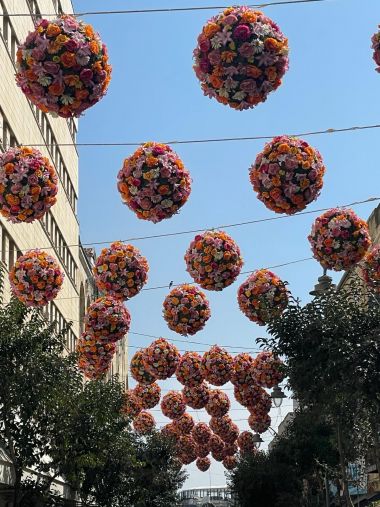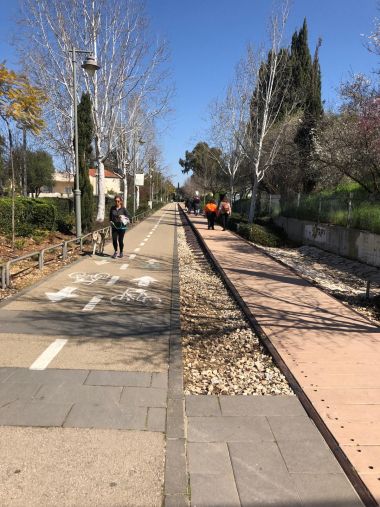Jerusalem is shining, perhaps even more so with the war

Jewish academic and Hebrew scholar Irene Lancaster reflects on her recent visit to Israel and the mood in Jerusalem as the war with Gaza continues.
I have just returned from visiting my family in Israel. Getting there was difficult. No flights from Manchester at present and from London only El Al, the Israeli carrier.
People who aren't Jewish urged me not to go – a war zone, they said. Jewish people said the opposite. Good for you!
In addition, no health insurance was available from this country, and I'm normally quite cautious, but was determined to make it there and survive without becoming ill.
Rules and regulations had changed for flights in this country and my small bottles of every-day items were scoured for signs of criminal intent, but in the end, and after around a 15 hour journey, I finally made it.
Last time I was in Jerusalem, I was giving a dvar Torah (sermon) at a central shul on the biblical Torah reading about the spies sent out by Moses to scour the Promised Land (Numbers 13). On that occasion, I pointed out that the Hebrew words for spy and pilgrim were almost identical – both tend to come on foot, and both come to learn from the Land. However, spies (i.e. politicians, journalists etc) from abroad would be more honest with themselves if they morphed into pilgrims and decided to learn something from Israel rather than constantly carp and misrepresent the facts.
A contemporary example of a pilgrim approach to Israel is that of Douglas Murray, one of the most brilliant thinkers of our own generation, who has made what he himself calls 'non-Jewish aliyah' to the beloved country since October 7 and has been speaking truth to power ever since, much to the embarrassment of anti-Semites and naysayers alike.
So what would I find when I set foot once again in the place which is now home to my children and grandchildren?
My younger daughter, currently living in Jerusalem, came to meet me at the airport, and we took a train all the way to Jerusalem, using a 'rav-kav', or all-purpose ticket card for the journey, which took less than half an hour. This was a new development. Thanks to the wife of my rabbi who provided me with her own rav-kav to use on the trip!
On arrival at the Jerusalem station, we hailed a taxi, whose driver, an Arab, had to be bargained down to the normally-accepted rate. The apartment in the Talpiot district was to my mind beautiful. I slept in the 'maamad', the bunker which is the room sealed against enemy attack. For some reason, I felt quite safe.
The first day we wandered down to Emek Refaim along the famous 'tayalet', or rail track walk, which is festooned on one side by John Betjeman-like Hebrew poetry extolling the beauty and wonder of trains. There were also original quotes from the founder of political Zionism, Theodor Herzl, who was aware of the importance of rail travel for the new age of locomotions. On the other side of the 'tayalet' are serious exercise outlets, warning that anyone with heart problems should desist from trying them out.

This sums up Israel to me – beautiful, practical, ancient, modern, poetic and health conscious, all in one space.
I doubt many of the people encountered during my stay were tourists. Most seemed to live there. As well as Hebrew, French, Arabic and English were ubiquitous. Yes, there was a bit of the Israeli chutzpah in the air, but also politeness now unknown in the UK. To my surprise, I found youngsters, of which there are more per head in Israel than in the UK, far more respectful of elders (i.e me) than is generally the case in this country. Elders are definitely cherished in the Jewish State, and afforded respect sadly now lacking in much of the West.
I was able to go swimming in a local pool, and engaged with the manager. He wondered why I was still living in the UK, being astonishingly well versed in the shenanigans of the British Foreign Secretary, the Prince of Wales and hate-filled crowds currently marching on Shabbat in London, as well as in Manchester.
My stay in Jerusalem coincided with the Speaker debacle in the UK Parliament, which I still don't understand. It seems to me that most UK Parliamentarians want Hamas to simply go away, not because Hamas are wrong, but because they have proved to be an embarrassment and yet, at the same time, Israel must lose at all costs.
The other daughter came with the grandchildren for Shabbat. They were all terrific. Such optimism, sense of fun and expressiveness. And all during a time of war. Amazing!
For relaxation, I managed to access the first two series of The Crown, reputedly the best of the lot, and found it somewhat incongruous watching this nostalgic retrospective of the British past, with Churchill, Macmillan, the great smog of 1952 (also part of Manchester's history, which is why my mother decided we had to move to the seaside to escape – I was one year old at the time), Princess Margaret, Suez, Kennedy and Profumo, all episodes of my very young life, which still remain vividly fixed in the psyche. Not to mention Billy Graham of course!
However, now, many Jews no longer feel part of the UK. I was warning about Rochdale, adjacent to centres of large Jewish demography, 25 years ago, when I taught there in schools. No-one listened. People thought I was mad, and many still do. But the chickens have definitely come home to roost – and with a very large bang. Because of indifference at best and sheer hostility at worst, Jews in the UK are currently terrified and none of the usual institutions are doing anything about it. For a long time now, there has been no real Jewish leadership in this country – only talking shops and sycophants. That is the Israeli view of the UK and that is also my view.
On the last day, my daughter and I visited the Kotel. This is the Hebrew name for the Western Wall of the Temple. For the first time in my life I was able to reach the Wall itself, where I recited a few Psalms and said prayers for the well-being of the State of Israel and the Jewish people.
Any conclusions? I was there for a week, simply to visit my family and relax. I found Jerusalem to be disciplined, exuberant, polite and argumentative all at once. If there was dejection - and why shouldn't there be – it was kept well hidden by a people intent on living life on their own terms, according to Jewish norms. And so well integrated; community cohesion 100 per cent, I simply couldn't believe it, despite everything that the Jewish people have been through in the last few months.
On Shabbat, it was drizzling slightly, so a morning prayer service was held in the underground garage of the block. For afternoon and evening services, a minyan (quorum) met in the courtyard of the block and we had a ring-side seat from our apartment, with wonderful views of the davenning (prayer) and of the Old City of Jerusalem.
This Shabbat the Torah reading has been Ki Tissa (Exodus 30:11 - 34:35), which includes the famous story of the Golden Calf. Moses on Mount Sinai is missed by the Children of Israel and so his brother Aaron, for the sake of peace, allows an intermediary to be fashioned by the people. This is the Golden Calf, which does not help matters in the long run.
I can't help feeling that the story of the Gold Calf is symbolic of what the rest of the world want the Jewish people to do at this present moment – cave in and take the easy way out. But let's hope that Israel, the Promised Land of the Jewish people and the only one where we feel really at home, does not cave in. Let's hope that somehow she can find the courage to hold out and make the right decisions in this worst situation for the Jewish people since the Shoah.
Blandishments never work and the people of Israel know this in their hearts. We have to think about the long term, just like our greatest teacher Moses Rabbeinu. Popularity may bring short-term advantages, but the true sage always has the big picture in mind.
It may be easy for me to talk – I don't have to make these kinds of decisions. However, I have tremendous faith in the people of Israel, now the largest grouping of Jews in the world, and this is why I felt far safer in a bunker in Jerusalem than I do in Greater Manchester, adjacent to Rochdale.
I am glad my family made the decision to live in Israel, despite all the hardships and opprobrium from the rest of the world. I also feel that this is what the Torah reading of Ki Tissa is telling us.
Make sure that seemingly positive short-term decisions are for real, and do not end up simply becoming yet another illusory Golden Calf. Israelis know this. Let's hope the rest of the world wakes up.











